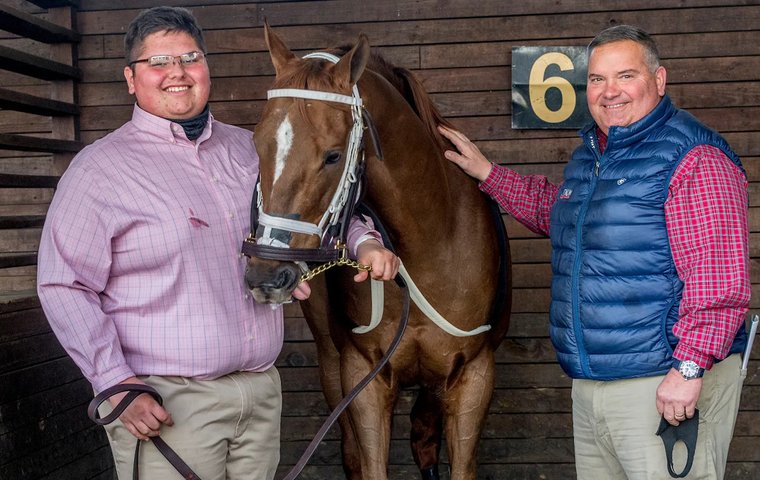
Shane Wilson has known plenty of the ups and downs of racing, but the Louisiana trainer is on the crest of the wave right now. He talks to Ken Snyder about the 40-year rollercoaster ride that has taken him there
Shane Wilson can’t tell you when the racing bug bit him. The leading trainer at the Fair Grounds this year can, however, tell you about a different bite he received 40 years ago that might have ended his career before it even began.
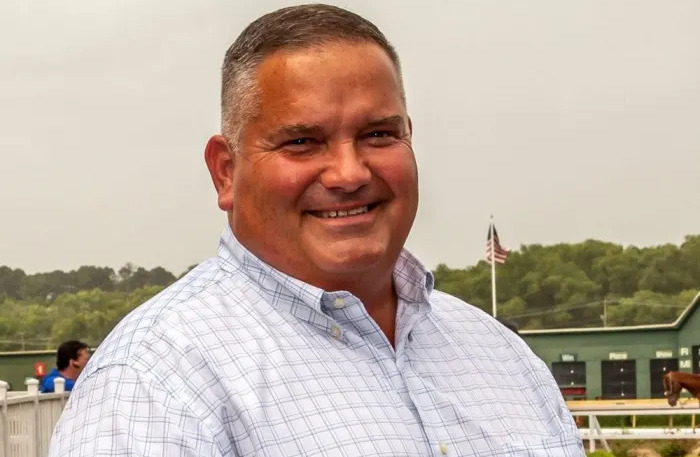 The source was a horse with the ominous name of Frightener, Wilson’s first assignment as a 14-year-old hotwalker at Louisiana Downs.
The source was a horse with the ominous name of Frightener, Wilson’s first assignment as a 14-year-old hotwalker at Louisiana Downs.
“Before I’d made one lap around the barn, he had bitten me in the chest and the ribs,” recalls Wilson of that morning in 1984. An old groom on the end of the shedrow rescued him. Wilson remembers his exact words: “Hey greenhorn, give me that horse before he kills you.”
The groom took Frightener and gave Wilson a mare named High Kick, owned by John Franks, who would figure prominently in Wilson’s future. His encounter with Frightener and introduction to racing had arisen from a chance meeting with a barn worker at the track.
“I was working in a McDonald’s and one Saturday morning a guy came in really, really early,” says Wilson, who lived in Haughton, five minutes from the Bossier City circuit. “I asked him if he was going fishing or hunting. He said he worked at the racetrack. I asked him if there was anything there that a 14-year-old kid could do?”
The difference in pay – $125 a week hotwalking horses – was far better than asking ‘do you want fries with your order?’ for $75 weekly.
“I played basketball and football and I was pretty athletic, so I said to myself ‘surely, I can walk a horse’.” (Frightener, of course, was the exception.) 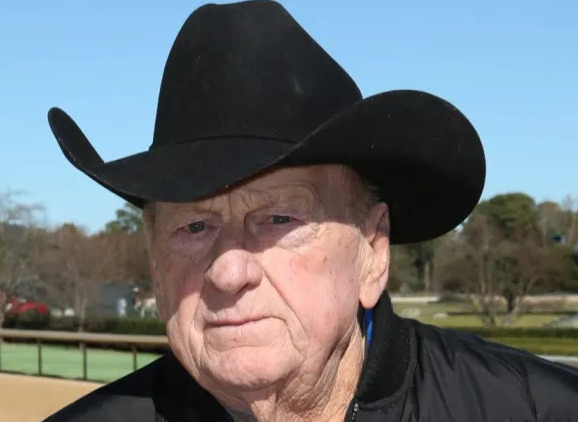
Prophetic meeting
Wilson was standing at the gate the morning he met Frightener, waiting on a possible call for a hotwalker over the track loudspeaker. It came, and from probably the best barn on the backside, that of the late Hall of Fame trainer Jack Van Berg. Wilson’s first meeting with him was prophetic.
“My job was to clean the hay rooms out and rake the corners when we got finished,” he says. “I was picking every piece of straw out of the shedrow while I was raking it, and a man came up behind me and put his hand on my shoulder, asked me my name.
“Then he said, ‘If you do everything in life, each job you approach, the way you’re raking this shedrow, you’re going to be successful some day’.”
Neither Wilson, now 54, nor Van Berg could have foreseen the degree of success he would be achieving 40 years later. Wilson was the leading trainer at the Fair Grounds 2023-24 meet with 50 wins, and his starters at all tracks topped $2.4 million in earnings last year. He has already broken through the $2m barrier for 2024, with more than half the year still to come.
A significant portion of those earnings have come from the six-year-old mare Ova Charged, who made her Graded-stakes breakthrough in the G3 Unbridled Sidney Stakes at Churchill Downs on Kentucky Oaks day. She has won again since, in the Louisville Legends Mademoiselle Stakes at Evangeline Downs.
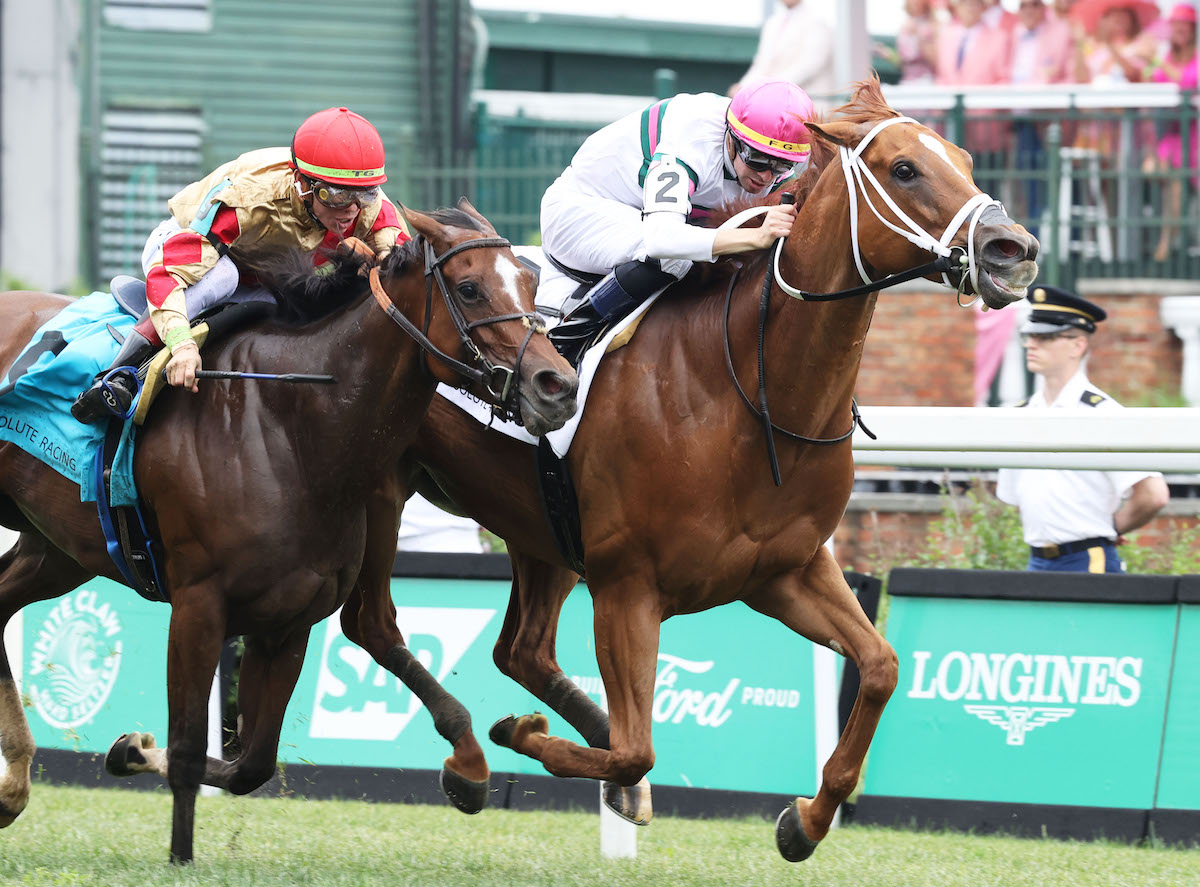 Ova Charged is unbeaten in five starts this year (all in stakes), has won 14 of her 17 races over four seasons, and in March posted a lofty 113 Beyer speed figure – the highest of the year by any horse, and the highest since Flightline – in the Page Cortez Stakes at the Fair Grounds.
Ova Charged is unbeaten in five starts this year (all in stakes), has won 14 of her 17 races over four seasons, and in March posted a lofty 113 Beyer speed figure – the highest of the year by any horse, and the highest since Flightline – in the Page Cortez Stakes at the Fair Grounds.
Like a machine
Her success, and his own over the years, stemmed from those formative years with Van Berg. One of the first things he learned was how a barn should operate. “With Jack, everything was so systematic,” he says. “Everybody had their responsibilities. The whole barn really worked like a machine.”
What most impressed Wilson, however, even as a teenage ‘greenhorn’, was Van Berg’s methods and powers of observation.
“He was doing stuff in the 1980s like jogging horses on pavement on the backside. The assistant would have a notepad and a pen and he’d tell them ‘this one has got too much toe, this one needs his shoes backed up, this one’s hocks are bothering him’. He’d watch them jog and tell the assistant what to do.
“He was so on top of everything. He had a vibrating steel plate and we’d have to hold the horses on it. Now there’s a lot of people using those, but this was like 1984, ’85.”
Wilson worked summers for Van Berg while in high school and also later at Louisiana Tech, before a shoulder injury ended his football career. He left college shortly afterwards, looking for a job that might give him the same sort of thrill. He didn’t need to look far.
Still able to compete
“My dad told me to figure out something I enjoyed doing that somebody would pay me to do, and I’d do well,” says Wilson. “I was always very competitive playing sports, and once that ended, I missed the competition, the drive, the winning. With the horses, I was able to still compete.”
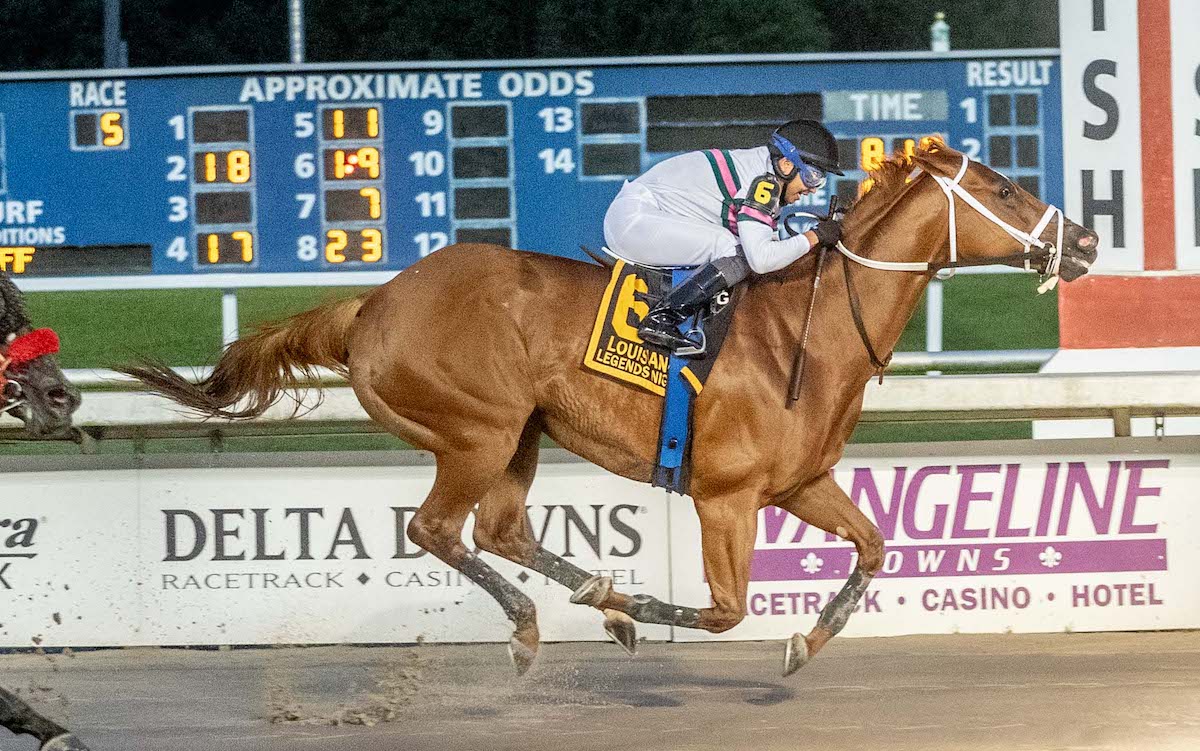 He went back to Louisiana Downs, back to Van Berg, where he progressed from hotwalking to taking care of the stable’s pony and putting bandages on the horses. He left the barn in 1988 to work for Van Berg’s assistant David Gelpi, when he went out on his own, and two years later moved again to work for Sam David. It turned out to be the final preparation for his own career as David, who won the Kentucky Oaks in 1997 with Blushing K.D., entrusted Wilson with the care of his horses running at Lone Star Park in that racetrack’s first year.
He went back to Louisiana Downs, back to Van Berg, where he progressed from hotwalking to taking care of the stable’s pony and putting bandages on the horses. He left the barn in 1988 to work for Van Berg’s assistant David Gelpi, when he went out on his own, and two years later moved again to work for Sam David. It turned out to be the final preparation for his own career as David, who won the Kentucky Oaks in 1997 with Blushing K.D., entrusted Wilson with the care of his horses running at Lone Star Park in that racetrack’s first year.
“Sam told me, ‘If it goes well, then I’ll let you handle it. If it’s not going well, I’ll call you and give you the chart every day and tell you what to do’,” says Wilson.
“We ended up fourth in the trainers’ standings the first year Lone Star opened. Sam was just there a few weekends. He let me run it. It gave me the confidence that I didn’t have to have him in the office to go and ask questions. I could do it myself. It pretty much gave me the thought that I can do this, if I had the horses.”
He wasn’t the only one who believed in his capabilities. Love blossomed across the shedrow back at Louisiana Downs, and his wife-to-be Becky – daughter of trainer Jim O’Bryant – saw in him what he was beginning to see for himself.
“Becky was the one who kind of pushed me whenever I was doing well with Sam’s horses. I remember winning five races one weekend, two at Lone Star and three at Shreveport, and she asked me why I was doing it for Sam when I could be doing it for myself.”
That was all the encouragement Wilson needed to hang his shingle in 1998, but it was all that he had. “What I didn’t realise when I left Sam and went out on my own was that I had to train the type of horse people would give Shane Wilson - who’s never been a trainer. The first five horses I had, a couple had chips in their knees and one had a bowed tendon.
“I realised really quickly that I was doing well with Sam’s horses because he had good clients and was getting good babies sent in every year. There wasn’t anybody sending that kind of horse to me when I started out.”
Twist in the tale
Like any young trainer hoping to move up, Wilson needed a break. It came a couple of years later when Firal Ryder, a client of Becky’s father, told Wilson he would let him train three two-year-old colts at the Fair Grounds if they didn’t meet their reserve at the sales. None did, and Wilson was New Orleans-bound, but there was a potential twist in the tale, going back to where it all started.
Louisiana oilman John Franks, who had owned the horse who substituted for the frightening Frightener on Wilson’s very first day at the track, could have derailed the scheme at the start.
“John walked up to Mr Ryder, pulled out his checkbook and told him he wanted to buy the three colts he’d bought back,” says Wilson, but Ryder was an honourable man and stuck to his promise. Wilson relives the tale.
“Ryder told Franks: ‘John, I’d love to but I can’t. Wilson is going to take them to the Fair Grounds and train them for me’. But Franks wouldn’t give up. In the end Ryder made him a proposition, saying: ‘Give me a check for $15,000, five grand apiece. We will be partners and Shane Wilson will train.”
Here was the breakthrough that Wilson needed, but the good times didn’t last long. Franks became his main client, but after the oilman’s death at the end of 2003 his widow dispersed the horses and Wilson was soon left with nothing. It seemed like the end of the dream.
Wilson had to quit the sport, taking on a sales job in Texas that, while profitable, was not what he wanted. “I’d be driving around Texas, around Austin, and I’d have TVG on my laptop in my truck so I could watch races all over the country,” says Wilson. “And every chance we got, we’d take off to San Antonio and go to Retama.”
Once again, it was Becky who provided the impetus for her husband to change the situation. One conversation made the difference.
“She could see that I wasn’t happy, told me that our boys Peyton and Connor weren’t happy, no-one was happy,” the trainer explains. “She told me to make some calls and see if we could get back into the horses.”
He did, and they did. Wilson was allotted ten stalls at Delta Downs, back home in Louisiana, and slowly rebuilt his stable. It was hard work, a test of his character.
“That first year back was all about how bad do I really want to do this? Will I just chuck it away if we’re not winning or will I stay in and fight?” says Wilson.
Deeply spiritual
A come-to-Jesus meeting driving down Interstate 49 after a disappointing day at the track led Wilson, a deeply spiritual man, to the answer.
His prayer asking God for help, pure and simple, preceded a sermon the next day at church where the pastor encouraged his congregation to ask for help. “I leaned over to Becky and said, ‘You’re not going to believe this, but I just did this yesterday’.”
The help helped. The turnaround wasn’t dramatic but it was real, and in 2010 Wilson’s horses won 15 races, exceeding the modest one-a-month goal he and Becky had set for the stable. The following year he trained 37 winners, and the curve has been ever upward since then.
Wilson gives Becky a lot of credit for his career but his father also gets a mention. If it hadn’t been for a little parental kick to the seat of the pants, none of the above might have happened at all. Three weeks into the job with Van Berg, Wilson decided to sleep late on a Saturday morning and blow off the racetrack job.
“My father came in and asked me what I was doing. I said, ‘I’m just going to work at McDonald’s – I’m not going to do that racetrack deal seven days a week’.
“He said, ‘Did you tell them you weren’t coming?’.
“I said, ‘No sir, I’m just not going’.
“So then he said, ‘No, you are going. Those people gave you a job and they’re expecting you to be there, and you better get dressed before you’re late, and you better not be late’.
“So I got dressed and I went to work and I never quit.”
Through cheap, broken-down horses, a dispersal sale that wiped him out, and times when there was nothing he could do but ask God for help, he still hasn’t quit.
Jack Van Berg was right when he told the 14-year-old Wilson that he’d be a success some day. That day is today.
• Visit the Fair Grounds website and the Evangeline Downs website
Children of Secretariat: Maritime Traveler keeping the show on the road
Royal Ascot review: watch all the action as Auguste Rodin moves up to world #2 spot
View the latest TRC Global Rankings for horses / jockeys / trainers / sires


